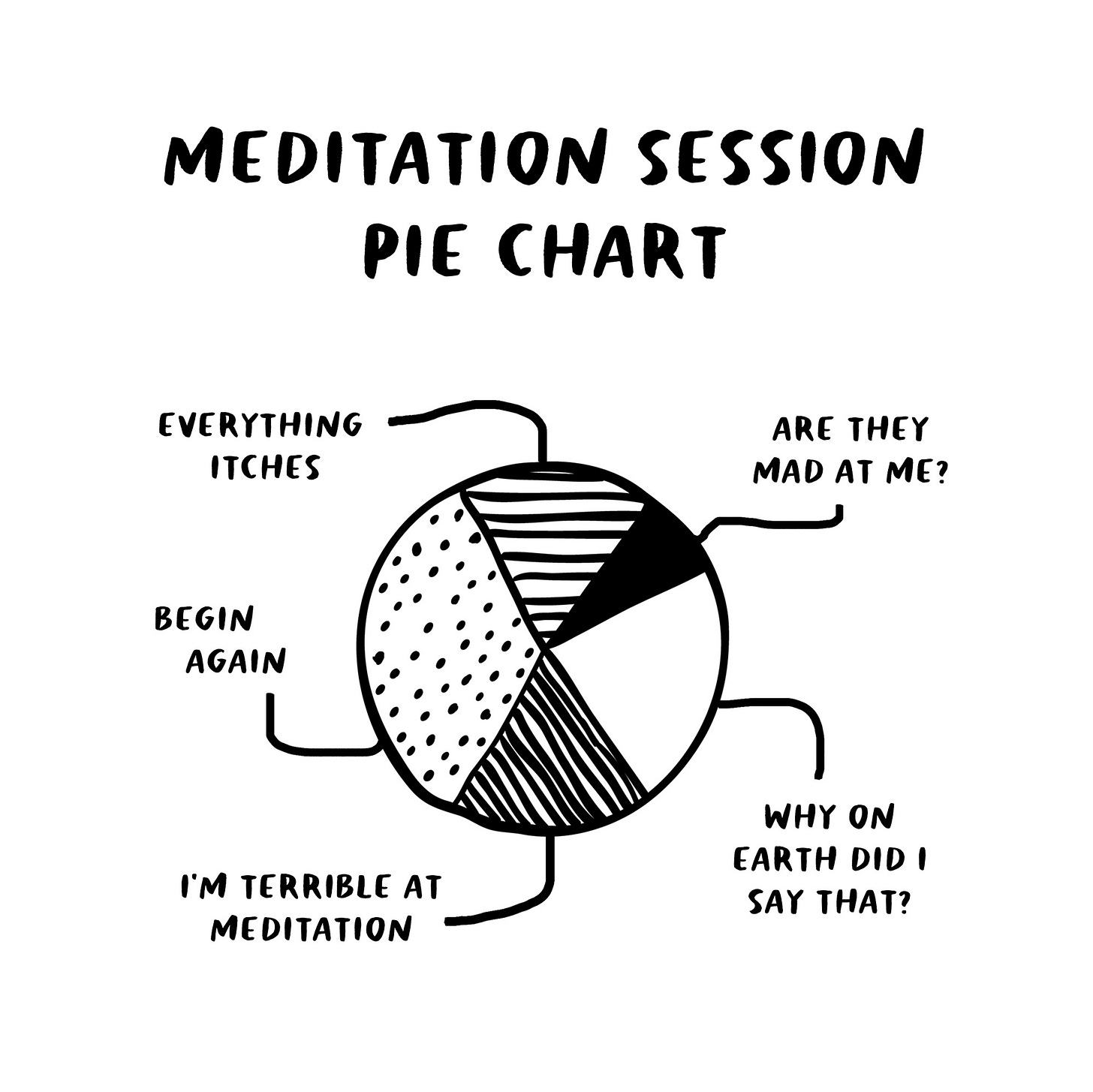Yes, you can meditate. Start by ditching those excuses.
Scientists have only recently proven what Buddhist monks have known for three thousand years: Meditation works. Time to give it a chance.
I started meditating because Jerry Seinfeld convinced me. It was about eight years ago, and I was listening to Seinfeld being interviewed on a podcast. When the host asked him why he practiced Transcendental Meditation for so many years, Seinfeld replied, “You know how it feels to wake up from a great nap? Imagine feeling like that all day.”
I thought to myself, I would love to feel like that all day. So I gave meditation a chance. My life has never been the same.
Meditation is everywhere these days. It’s the subject of countless books, articles, blog essays, podcasts, TED talks, YouTube videos, IG posts, and yes, Substack newsletters. Everyone agrees: Meditation is awesome! Meditation works! Meditation is life changing!
So how come you haven’t given it a chance?
I’m sure you have your reasons. I prefer to think of them, non-judgementally, as excuses. So allow me to cut each one down to size, a la Bruce Lee, and kick away those excuses one by one.
Excuse No. 1: I don’t have time.
This is like saying you don’t have time to put gas in your car. While there is no one correct answer to the question of how long we should meditate, many teachers suggest two 20-minute sessions per day. If that seems like a lot, I would suggest starting with 10 minutes, preferably first thing in the morning. Do you really think you can’t carve that out of your oh-so-busy day?
Many of the same people who claim they’re too busy to meditate spend hours at the gym or in exercise classes working on their bodies. Exercise is important, but if you can spend that kind of time pumping iron, you can devote a portion to pumping up your brain. That’s not to mention all the hours we waste binge watching TV shows or scrolling through social media feeds on our phones, which have been scientifically proven to hinder our mental acuity.
In fact, meditation can save time because it empowers us to work more efficiently. If you’re tired and unfocused, a task that should take 40 minutes might take you an hour, with an inferior result. If you meditate for 15 minutes, you’ll complete that task in 40, and feel much better while doing it.
If you don’t want to meditate, that’s perfectly fine. But it’s not because you don’t have the time.
Excuse No. 2: “____” is my meditation.
When I ask people if they meditate, they will sometimes reply by saying, “Well, I pray. That’s my meditation.” Or, “I do yoga. Same thing.”
Not really. It would be like if I asked you if you played tennis today and you replied, “Well, I went for a run. Same thing.” There may be similarities, but they’re not the same thing.
There are many different forms of meditation, or what’s commonly referred to as contemplative practices. They include movement meditations like yoga, walking, and martial arts. There are also many different forms of sitting meditation. Personally, I practice mindful meditation, which involves focusing on the mind and the breath. There’s Jerry Seinfeld’s favorite practice, TM, which uses a mantra, and yoga nidra, which is more restful. (The neurologist turned podcaster Andrew Huberman refers to this as NSDR, which stands for Non Sleep Deep Rest.) Metta, or loving kindness meditation, is a beautiful way to access this mindspace.
Prayer, yoga, exercise – all of these do wonders for our spiritual and mental health. But just like tennis is a specific sport, meditation is a specific practice that involves an intentional way of sitting, breathing and thinking. If you’re not meditating, you’re not meditating.
Excuse No. 3: Meditation isn’t for me.
People who say this think of meditation all wrong. They assume it’s just a big pile of esoteric, phillsophical, woo-woo hippie dippie gobbledygook. I encourage you instead to think about meditation as a workout for your brain with proven benefits. Over the last 20 years, western science has finally looked upon meditation as an area of serious study. By using fMIR scans, blood work and saliva tests, among other quantitative methods, scientists are discovering what the monks in Nepal have known for three thousand years: This stuff works.
Meditation helps you learn how your brain functions, which in turn empowers you to use those mechanisms to feel more focused and less anxious. It’s all about preparing for that critical instant between stimulus and response. When confronted with a challenging event or uncomfortable feeling, we are much better off responding rationally than reacting emotionally. Managing our thoughts in this manner won’t fix our problems, but it may help prevent us from making them worse.
I hate to break it to you, but your brain is not your friend. It’s not wired to make you happy. It’s wired to keep you alive. That requires keeping us in a constant state of anxiety. This state, as manifested in our fight-or-flight response, is useful when we are faced with a grave threat, but chronic stress takes a toll on our bodies, and especially our immune systems. And it doesn’t take much for low-grade anxiety to flare up into something that is disproportionate to the stimulus that triggered it.
So when you say meditation is not “for you,” what you’re saying is that being less stressed, more healthy, and more productive is not “for you.” And that’s just not true.
Excuse No. 4: I’m terrible at it.
Good news, everyone. It is literally impossible to be “bad” at meditation! Once you learn how to do it right, you’ll realize that it’s impossible to do it wrong.
Wait, wait, you say. I can’t turn off my thoughts. Of course you can’t! We can’t stop our brains from thinking any more than we can stop our hearts from beating. The goal of meditation isn’t to stop your thoughts. It’s to become aware of your thoughts. That way you can redirect them accordingly.
Imagine that your thoughts are goldfish swimming in a tank. They’re scurrying about, bumping into each other, moving quickly and aimlessly. Most of the time, we are so lost in our thoughts, it’s like we’re swimming in the tank right along with them. Meditation takes us out of the water. It empowers us to see our thoughts as they really are. Look at those silly little fish swimming around in there. Aren’t they cute?
Here's how it works. You take your seat and focus on your breath. In time, probably within seconds, your mind will wander. At some point, you notice the wandering. Silly little fish! Then you guide your thoughts back to your breath. You might be able to focus on your breath for only a few seconds. Eventually, you’ll probably be able to do it for much longer. Each time you redirect your thoughts in this manner, it’s like doing a rep for your brain.
I’m no expert on meditation, but I do know the benefits of the practice because I’ve felt them in my own life. I get stressed, worried, anxious and depressed just like everyone else. Through meditation, I’ve learned how to let go of those feelings and experience inner peace. It may only last a moment, but with enough practice, that moment can become a string of moments, and pretty soon it becomes a different way of being.
There’s a reason meditation has been around for thousands of years and is experiencing a modern renaissance. If you want to understand the reason, you have to start. And you can’t start until you wash away your excuses.
All I am saying is give meditation a chance.
.







Love this post, Seth - thank you. Can you suggest resources (books, video, other media) to help a newbie on the path to meditation?
This is a great list. #4 was always an impediment for me, until I learned that you aren't supposed to stop thinking altogether. Then it became much more approachable. I also like asking, "is it useful"? when I can't stop thinking about something. The answer is usually no.